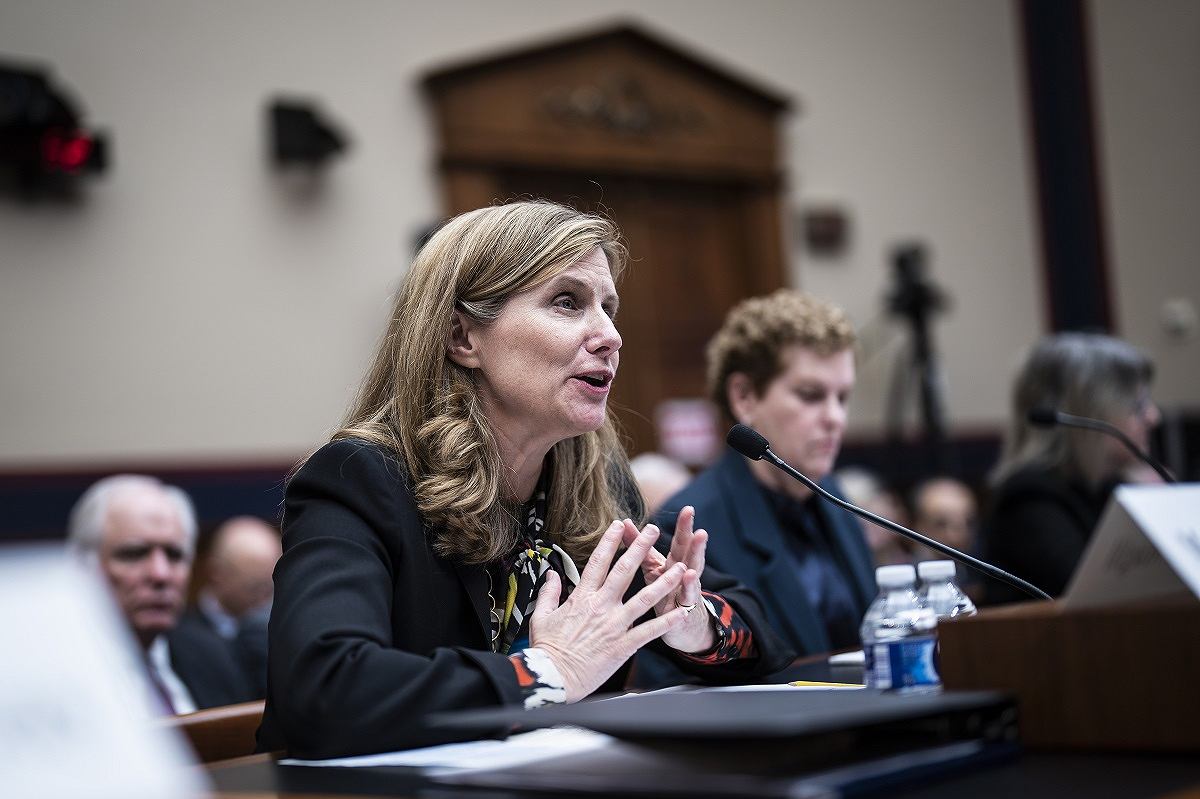
University of Pennsylvania President Liz Magill testifies during a House Education and Workforce Committee Hearing on holding campus leaders accountable and confronting antisemitism on Dec. 5, 2023, in Washington.
16:22 JST, December 8, 2023
The president of the University of Pennsylvania released a video late Wednesday walking back some of her testimony at a congressional hearing this week about antisemitism on campus after calls for her resignation followed her remarks.
In the video, Liz Magill said she should have responded differently to questions Tuesday from Rep. Elise Stefanik (R-N.Y.) about whether calls for the genocide of Jewish people would violate university policies.
“I was not focused on, but I should have been, the irrefutable fact that a call for genocide of Jewish people is a call for some of the most terrible violence human beings can perpetrate,” Magill said Wednesday. “It’s evil, plain and simple.”
On Thursday, some Penn trustees met virtually for an informal gathering, a university spokesman said. And an alumnus and donor warned he could rescind a $100 million gift to the university “absent a change in leadership and values at Penn in the very near future.”
Magill has led Penn since July 2022 after previously serving as executive vice president and provost of the University of Virginia and as a professor and dean at Stanford Law School.
She became the focus of forceful condemnations on and off campus after her remarks Tuesday before a House committee that summoned Magill, Harvard University President Claudine Gay and Massachusetts Institute of Technology President Sally Kornbluth to testify about efforts to stop antisemitism on their campuses since the war in Israel and Gaza began. On Thursday, Rep. Virginia Foxx (R-N.C.), who chairs the House Educations and Workforce Committee, said the panel would now investigate the learning environments at the schools.
On Tuesday, the presidents were pressed by Stefanik to answer whether calls for the genocide of Jews would violate university code of conduct or rules on bullying and harassment.
Magill said such speech would violate the school’s code of conduct “if the speech turns into conduct, it can be harassment. Yes.” Pressed further by Stefanik, Magill said: “It is a context-dependent decision, congresswoman.”
Pennsylvania Gov. Josh Shapiro (D) said Magill’s comments were “absolutely shameful.”
“It should not be hard to condemn genocide,” he said Wednesday in Philadelphia while visiting a Jewish-owned restaurant that was the site of a recent pro-Palestinian protest.
Shapiro, who is a nonvoting trustee of Penn, told reporters the university’s board needed to make a “serious decision” on whether Magill should represent the institution.
Pressure to act mounted quickly on and off campus. A petition calling for Magill’s resignation had more than 15,000 signatures as of Thursday afternoon. The rabbi and co-presidents of Penn Hillel said Wednesday in a statement: “President Magill’s refusal to draw a line around any antisemitic speech – no matter how vitriolic and hateful – as a violation of Penn’s policies, is extremely disappointing. If there is any ambiguity with respect to the Code’s application to this type of threat, it should be immediately amended.”
The New York Times also reported that Marc Rowan, the chief executive of Apollo Global Management and chair of the board at Penn’s Wharton School of Business, sent a letter to trustees asking: “How much damage to our reputation are we willing to accept?”
On Thursday, Ross Stevens, founder and chief executive of Stone Ridge Asset Management, said he had grounds to rescind $100 million in shares donated to Penn, a move first reported by Axios. In a note to staff, he cited Tuesday’s testimony by Magill and also said the president “has enabled and encouraged antisemitism and a climate of fear and harassment at Penn.”
“I love Penn and it is important to me, but our firm’s principles are more important,” Stevens wrote. In a letter to the university, a firm representing Stone Ridge said the company and Stevens were open to discussing the matter further.
College leaders have faced intense scrutiny over statements and other actions made in recent months as they seek to balance free-speech traditions and protections while also trying to prevent bias and hate.
Magill’s video message Wednesday acknowledged she had not found the right balance in her congressional testimony. She stopped short of apologizing.
“In that moment I was focused on our university’s long-standing policies aligned with the U.S. Constitution which say that speech alone is not punishable,” Magill said.
Magill also said the university would review its policies, which she said had been long guided by the constitution and law. “In today’s world where we are seeing signs of hate proliferating across our campus and our world in a way not seen in years, these policies need to be clarified and evaluated.”
In recent weeks, Magill had issued statements condemning antisemitic emails to Penn staff and “vile” messages projected on several campus buildings. “Our Jewish community is afraid. Our Muslim, Arab, and Palestinian communities feel unseen and unheard. I condemn the death threats and doxing that many at Penn are experiencing based only on their identity, their affiliations, or their views of the suffering in this war,” Magill told trustees in early November.
Free speech advocates said tightening policies on self-expression is not the solution.
“Were Penn to retreat from the robust protection of expressive rights, university administrators would make inevitably political decisions about who may speak and what may be said on campus,” the Foundation for Individual Rights and Expression said in a statement. “Such a result would undoubtedly compromise the knowledge-generating process free expression enables and for which universities exist.”
Facing criticism, Harvard’s president on Wednesday also sought to clarify the congressional testimony. “There are some who have confused a right to free expression with the idea that Harvard will condone calls for violence against Jewish students,” Gay said. “Let me be clear: Calls for violence or genocide against the Jewish community, or any religious or ethnic group are vile, they have no place at Harvard, and those who threaten our Jewish students will be held to account.”
The Israeli-Palestinian conflict has long been a source of debate on college campuses, and tensions were reignited since the surprise Oct. 7 attack by Hamas that killed at least 1,200 people in Israel. Since then, more than 17,000 people have died in Gaza, according to the Gaza Health Ministry. About 80 percent of Gaza’s population of more than 2 million has been displaced during Israeli military actions in the aftermath, according to the United Nations.
In addition to concerns about antisemitism, campuses also are trying to protect against Islamophobia and other bias. The Education Department has opened investigations into several colleges and K-12 institutions, including Harvard, over allegations of antisemitism or Islamophobia.
While there had been a rise in hate crimes in the United States even before the war, federal officials reported in late October that they were responding to more threats against Arab, Jewish and Muslim communities as the conflict intensified.
Top Articles in News Services
-

Survey Shows False Election Info Perceived as True
-

Hong Kong Ex-Publisher Jimmy Lai’s Sentence Raises International Outcry as China Defends It
-

Japan’s Nikkei Stock Average Touches 58,000 as Yen, Jgbs Rally on Election Fallout (UPDATE 1)
-

Japan’s Nikkei Stock Average Falls as US-Iran Tensions Unsettle Investors (UPDATE 1)
-

Trump Names Former Federal Reserve Governor Warsh as the Next Fed Chair, Replacing Powell
JN ACCESS RANKING
-

Producer Behind Pop Group XG Arrested for Cocaine Possession
-

Japan PM Takaichi’s Cabinet Resigns en Masse
-

Man Infected with Measles Reportedly Dined at Restaurant in Tokyo Station
-

Israeli Ambassador to Japan Speaks about Japan’s Role in the Reconstruction of Gaza
-

Videos Plagiarized, Reposted with False Subtitles Claiming ‘Ryukyu Belongs to China’; Anti-China False Information Also Posted in Japan

























